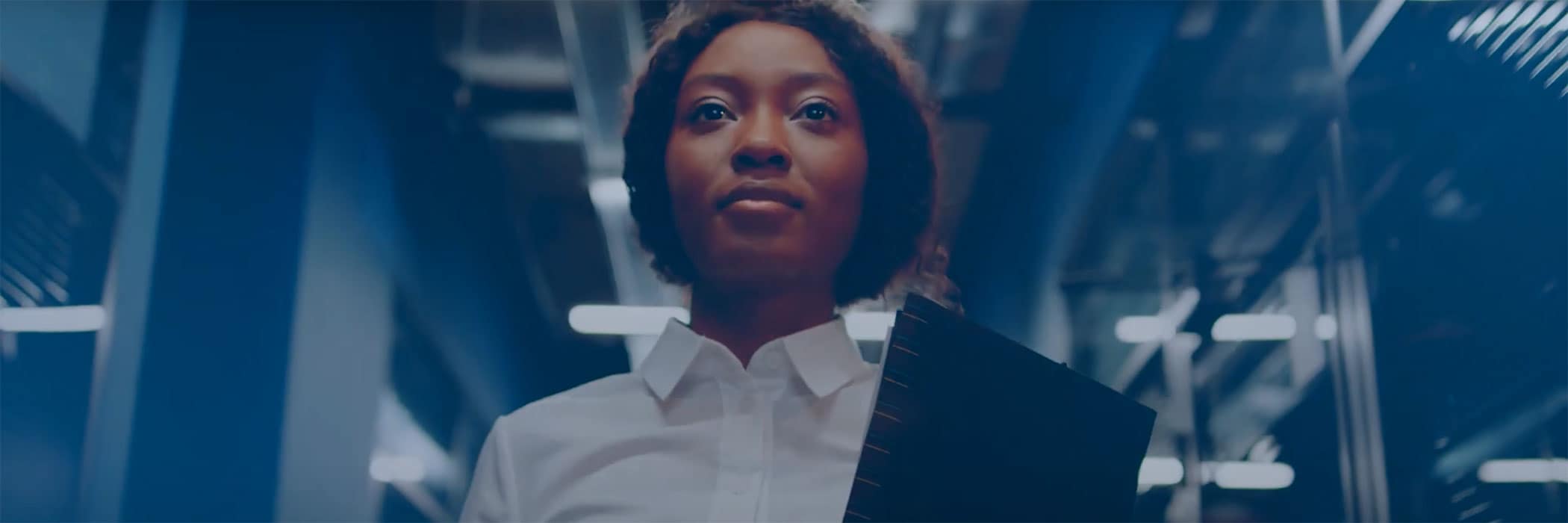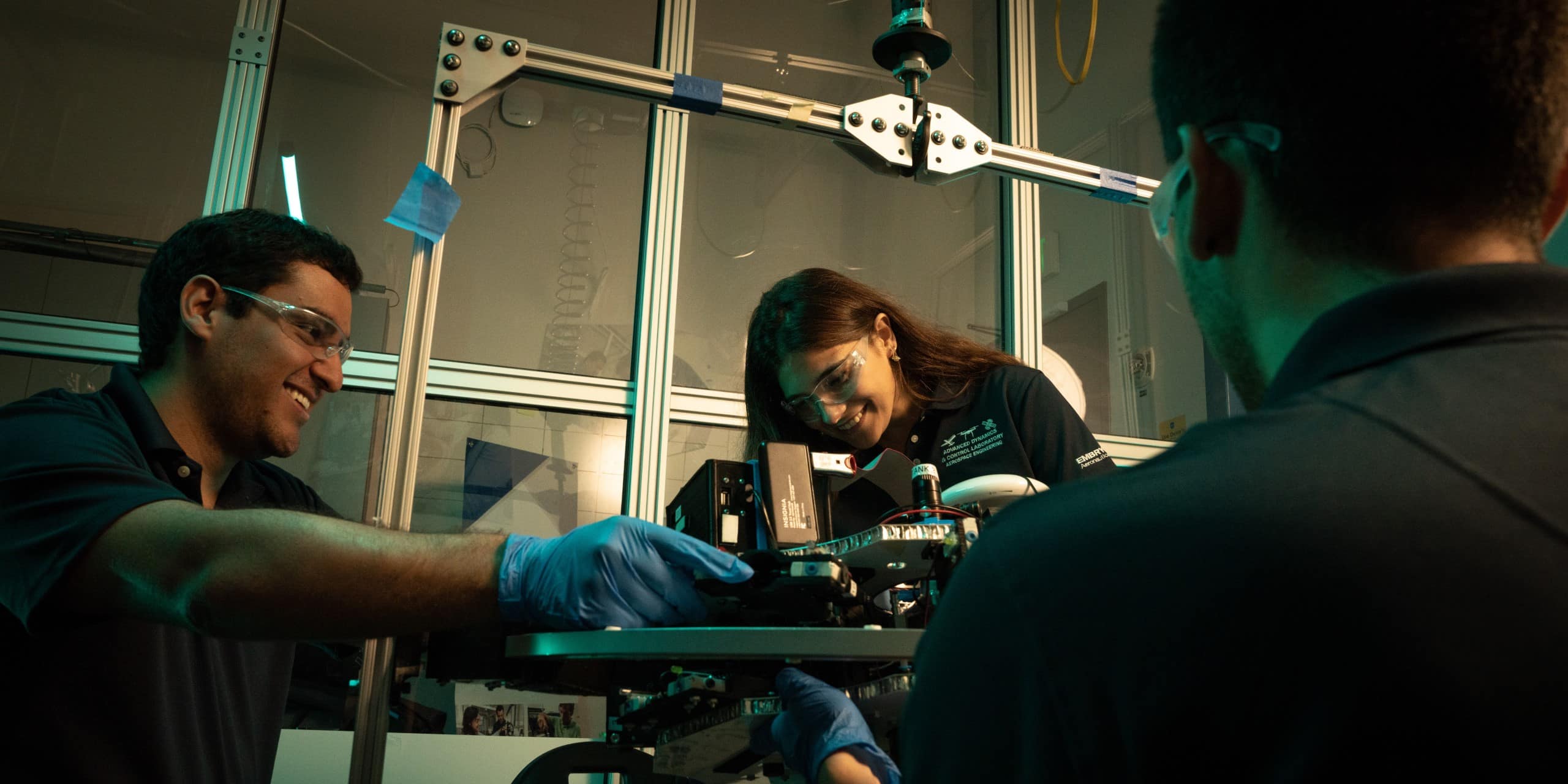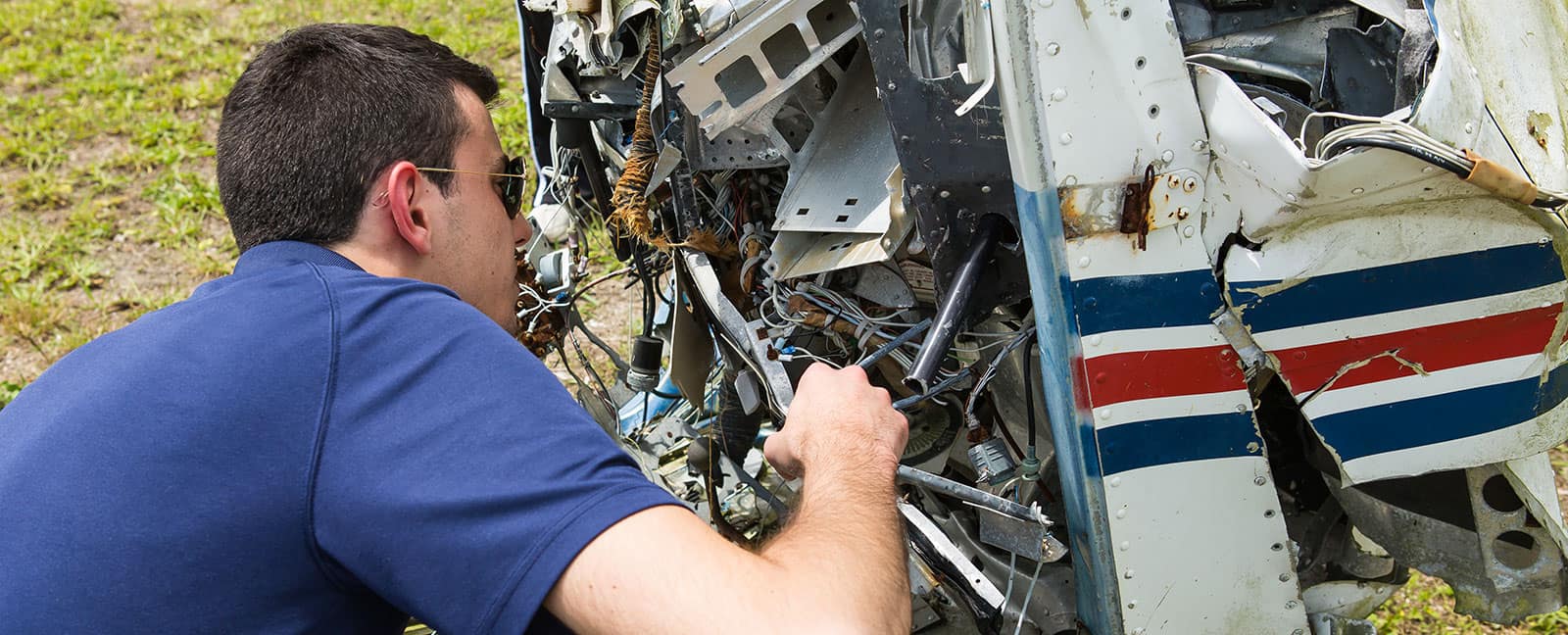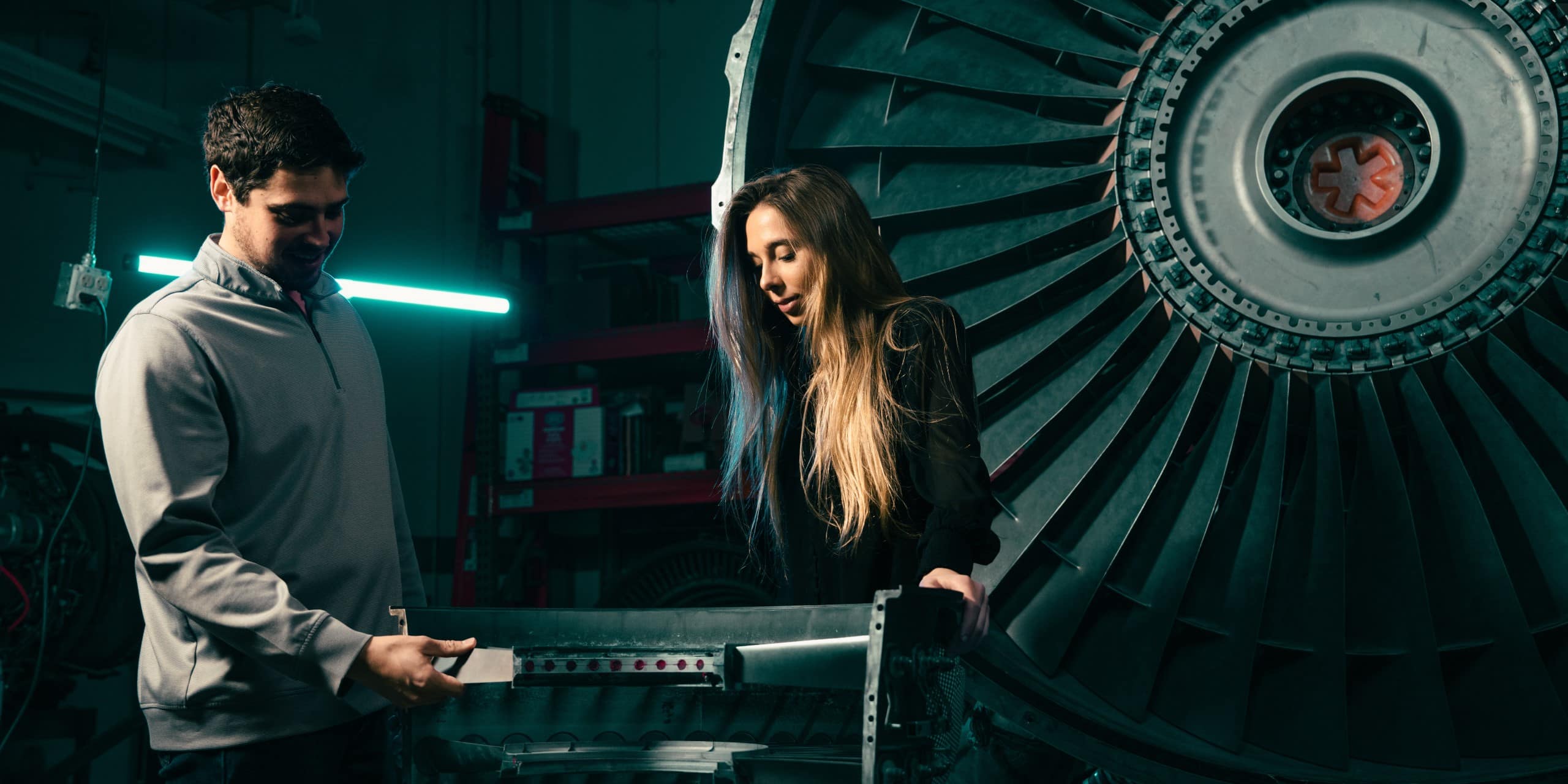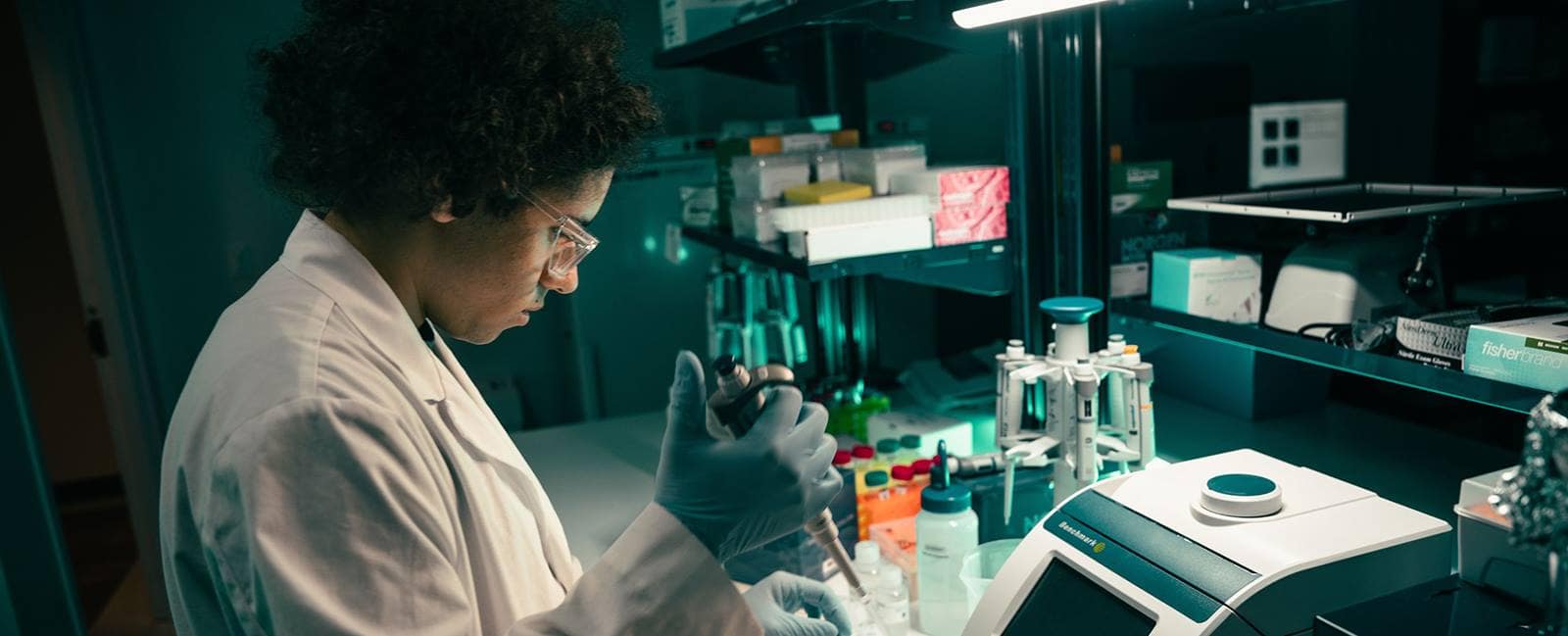
Bachelor of Science in
Aerospace Physiology
The Bachelor of Science in Aerospace Physiology blends aerospace and life science to prepare students for new opportunities in biomedicine and space.
About the Bachelor of Science in Aerospace Physiology
Embry-Riddle offers the only undergraduate degree in the nation that combines aerospace and life science. The Bachelor of Science in Aerospace Physiology is designed to take advantage of emerging opportunities in space and biomedicine. The program explores the effects of zero gravity, different atmospheric conditions, aerospace medicine and health and radiation on human physiology.
The extensive curriculum prepares students for numerous opportunities in medical fields, research and development within the aerospace industry. A degree in Aerospace Physiology provides expertise in areas such as behavioral neuroscience, nutritional biochemistry, pharmacotherapeutics, health and human performance and the human microbiome.
Why You Should Study this Aerospace Physiology
Aerospace Physiology is a combination of the study of the aviation/aerospace environment and medicines and human life systems. A career in aerospace physiology may be for you if you:
- Are interested in the impacts of stress and fatigue in space
- Have a fascination with space
- Want to study aviation and medicine together
- Would enjoy developing systems to support life systems
Student Learning Outcomes
While learning about aerospace physiology, you will have the opportunity to:
- Analyze the body’s reaction to extreme environments, like space and the upper atmosphere.
- Study how extreme environments influence the intricacies of biological systems, including the impacts of microgravity and radiation on the human body.
- Work alongside astronauts and engineers while revolutionizing the aerospace industry.
Aerospace Physiology Career Opportunities
Careers and Employers
Embry-Riddle graduates are prepared to enter the industry as aerospace physiologists and biologists or dedicate their efforts to medical equipment development and aerospace medicines, with a 100% placement rate within a year of graduation.
Students earning a degree in Aerospace Physiology often accept employment offers with leading companies in the field such as:
- Department of Defense
- NASA
- Pharmaceutical Companies
- Research Laboratories
Aerospace Physiology Salary Information
Receiving an Aerospace Physiology degree from Embry-Riddle provides the opportunity for competitive salaries, averaging $44,200 annually as of 2022.
DETAILS
About Aerospace Physiology at the Daytona Beach, FL Campus
Aerospace Physiology courses are taught by experienced instructors who have worked in the aerospace medicine and health fields. These courses provide a comprehensive education covering subjects like data analysis, human factors in aviation and molecular and cellular biology.
Our Aerospace Physiology program also includes clinical rotations in partnership with local hospitals. This allows students to gain hands-on experience and exposure to the latest medical innovations, treatment techniques and cutting-edge research.
Aerospace Physiology Information
- Credits: 121
- Online or In-Person: In-Person
Helpful Links
- Tour our Daytona Beach Campus
- Discover the Department’s Faculty
- Explore the Fields of Study: Applied Science & Aviation
- Find Related Clubs & Organizations
Student Learning Outcomes
Students will:
- Employ critical thinking skills and scientific best practices in research design and experimentation.
- Apply principles of biological sciences to aerospace physiology.
- Correlate fundamental scientific instrumentation with aerospace physiology.
- Complete projects arising from sound research practices.
- Analyze current research in aerospace physiology related to treatment interventions.
General Education Requirements
For a full description of Embry-Riddle General Education guidelines, please see the General Education section of this catalog. These minimum requirements are applicable to all degree programs
General Education List
| Communication Theory and Skills (COM 122, COM 219, COM 221) | 9 | |
| Humanities - Lower level | 3 | |
| Social Sciences - Lower level | 3 | |
| Humanities or Social Sciences - Lower or Upper level * | 3 | |
| Humanities or Social Sciences - Upper level | 3 | |
| Computer Science (CS 118 or CS 223 or EGR 115 or CYB 235) | 3 | |
| Mathematics (MA 210 required) | 6 | |
| Physical and Life Sciences (BIO 120, CHM 110 or PS 113) | 6 | |
| Total Credits | 36 | |
Aerospace Physiology Core Requirements (63 hours)
| BIO 110 | Research Methods I | 1 |
| BIO 111 | Research Symposium | 1 |
| BIO 120 | Foundations of Biology I | 3 |
| BIO 120L | Foundations of Biology I Laboratory | 1 |
| BIO 121 | Foundations of Biology II | 3 |
| BIO 121L | Foundations of Biology II Lab | 1 |
| BIO 215 | Genetics | 3 |
| BIO 215L | Genetics Laboratory | 1 |
| BIO 305 | Human Anatomy and Physiology I | 3 |
| BIO 305L | Human Anatomy and Physiology Laboratory | 1 |
| BIO 306 | Human Anatomy and Physiology II | 3 |
| BIO 306L | Human Anatomy and Physiology II Laboratory | 1 |
| BIO 405 | Molecular and Cell Biology | 3 |
| BIO 405L | Molecular and Cell Biology Laboratory | 1 |
| BIO 450 | Exercise Physiology and Human Performance | 3 |
| CHM 110 | General Chemistry I | 3 |
| CHM 110L | General Chemistry I Laboratory | 1 |
| CHM 111 | General Chemistry II | 3 |
| CHM 111L | General Chemistry II Laboratory | 1 |
| CHM 210 | Organic Chemistry I | 3 |
| CHM 210L | Organic Chemistry I Laboratory | 1 |
| CHM 211 | Organic Chemistry II | 3 |
| or CHM 310 | Biochemistry | |
| CHM 211L | Organic Chemistry II Laboratory | 1 |
| or CHM 310L | Biochemistry Laboratory | |
| HF 300 | Human Factors I: Principles and Fundamentals | 3 |
| HF 440 | Aerospace Physiology | 3 |
| or AS 357 | Flight Physiology | |
| MA 222 | Business Statistics | 3 |
| PS 113 | Introductory Physics I | 3 |
| PS 113L | Introductory Physics I Laboratory | 1 |
| PS 117 | Introductory Physics II | 3 |
| PS 117L | Introductory Physics II Lab | 1 |
| UNIV 101 | College Success | 1 |
| Total Credits | 63 | |
Specified Electives (12-13 hours)
| BIO 142 | Intro to Environmental Science | 3 |
| BIO 211 | Research | 1 |
| BIO 216 | Microbiology | 3 |
| BIO 216L | Microbiology Laboratory | 1 |
| BIO 299 | Special Topics in Biology | 1-6 |
| BIO 311 | Research | 1 |
| BIO 321 | Behavioral Neuroscience I | 3 |
| BIO 322 | Behavioral Neuroscience II | 3 |
| BIO 335 | Cell Signaling and Disease | 3 |
| BIO 399 | Special Topics in Biology | 1-6 |
| BIO 411 | Research Symposium II | 1 |
| BIO 430 | Fundamentals of Infectious Diseases | 3 |
| BIO 440 | Clinical Rotation | 3 |
| BIO 444 | Immunology | 3 |
| BIO 499 | Special Topics in Biology | 1-6 |
| CHM 211 | Organic Chemistry II | 3 |
| CHM 211L | Organic Chemistry II Laboratory | 1 |
| CHM 310 | Biochemistry | 3 |
| CHM 310L | Biochemistry Laboratory | 1 |
| ES 315 | Space Environment and Effects | 3 |
| HF 312 | Ergonomics and Bioengineering | 3 |
| HF 321 | Psychopharmacology | 3 |
| HF 326 | Human Performance in Extreme Environments | 3 |
| HF 399 | Special Topics in Human Factors | 1-6 |
| HF 499 | Special Topics in Human Factors | 1-6 |
| ME 320 | Fundamentals of Biomechanics | 3 |
| ME 442 | Biofluid Mechanics | 3 |
| PSY 101 | Introduction to Psychology * | 3 |
| PSY 310 | Sensation and Perception | 3 |
| PSY 320 | Aviation Psychology | 3 |
| PSY 335 | Physiological Psychology | 3 |
| SF 315 | Sustainability and Environmental Compliance | 3 |
| SF 355 | Industrial Hygiene and Toxicology | 3 |
| SP 220 | Life Support Systems | 3 |
| Total | 12-13 | |
Open Electives
| Open Electives - 100-400 Level | 6 | |
| Open Electives - 300-400 Level | 9 | |
| Total Credits | 15 | |
| Total Degree Credits | 120-121 | |
- *
PSY 101 must be taken as a Specified Elective if not completed as a lower-level General Education Social Science requirement.
Suggested Plan of Study
Students should be aware that several courses in each academic year may have prerequisites and/or co-requisites. Please check the course descriptions in this catalog before registering for classes to ensure requisite sequencing.
| Year One | ||
|---|---|---|
| Fall | Credits | |
| COM 122 | English Composition | 3 |
| UNIV 101 | College Success | 1 |
| MA 140 | College Algebra 1 | 3 |
| CHM 110 | General Chemistry I | 3 |
| CHM 110L | General Chemistry I Laboratory | 1 |
| BIO 120 | Foundations of Biology I | 3 |
| BIO 120L | Foundations of Biology I Laboratory | 1 |
| BIO 110 | Research Methods I | 1 |
| Credits Subtotal | 16.0 | |
| Spring | ||
| HU 14X Elective | 3 | |
| PSY 101 | Introduction to Psychology | 3 |
| CHM 111 | General Chemistry II | 3 |
| CHM 111L | General Chemistry II Laboratory | 1 |
| BIO 121 | Foundations of Biology II | 3 |
| BIO 121L | Foundations of Biology II Lab | 1 |
| BIO 111 | Research Symposium | 1 |
| Credits Subtotal | 15.0 | |
| Credits Total: | 31.0 | |
| Year Two | ||
|---|---|---|
| Fall | Credits | |
| COM 219 | Speech | 3 |
| CHM 210 | Organic Chemistry I | 3 |
| CHM 210L | Organic Chemistry I Laboratory | 1 |
| BIO 215 | Genetics | 3 |
| BIO 215L | Genetics Laboratory | 1 |
| BIO 305 | Human Anatomy and Physiology I | 3 |
| BIO 305L | Human Anatomy and Physiology Laboratory | 1 |
| Credits Subtotal | 15.0 | |
| Spring | ||
| COM 221 | Technical Report Writing | 3 |
| MA 210 | Introduction to Data Science | 3 |
| Specified Elective | 3 | |
| Open Elective - Lower Level | 3 | |
| BIO 306 | Human Anatomy and Physiology II | 3 |
| BIO 306L | Human Anatomy and Physiology II Laboratory | 1 |
| Credits Subtotal | 16.0 | |
| Credits Total: | 31.0 | |
| Year Three | ||
|---|---|---|
| Fall | Credits | |
| CS 118 | Fundamentals of Computer Programming | 3 |
or CS 223
|
Scientific Programming in C | |
or EGR 115
|
Introduction to Computing for Engineers | |
or CYB 235
|
Computer and Network Technologies | |
| PS 113 | Introductory Physics I | 3 |
| PS 113L | Introductory Physics I Laboratory | 1 |
| CHM 310 | Biochemistry 2 | 3 |
| CHM 310L | Biochemistry Laboratory 2 | 1 |
| Specified Elective | 3-4 | |
| Credits Subtotal | 14.0-15.0 | |
| Spring | ||
| HF 300 | Human Factors I: Principles and Fundamentals | 3 |
| MA 222 | Business Statistics | 3 |
| PS 117 | Introductory Physics II | 3 |
| PS 117L | Introductory Physics II Lab | 1 |
| Specified Elective | 3 | |
| Open Elective - Upper Level | 3 | |
| Credits Subtotal | 16.0 | |
| Credits Total: | 30.0-31.0 | |
| Year Four | ||
|---|---|---|
| Fall | Credits | |
| BIO 405 | Molecular and Cell Biology | 3 |
| BIO 405L | Molecular and Cell Biology Laboratory | 1 |
| BIO 450 | Exercise Physiology and Human Performance | 3 |
| Humanities/Social Science - Lower Level | 3 | |
| Specified Elective | 3 | |
| Credits Subtotal | 13.0 | |
| Spring | ||
| HF 440 | Aerospace Physiology | 3 |
or AS 357
|
Flight Physiology | |
| Humanities/Social Science - Upper Level | 3 | |
| Open Elective - Lower Level | 3 | |
| Open Elective - Upper Level | 3 | |
| Open Elective - Upper Level | 3 | |
| Credits Subtotal | 15.0 | |
| Credits Total: | 28.0 | |
| Total Degree Credits | 120-121 | |
- 1
MA 111, 120 or 140
- 2
CHM 211 and CHM 211L OR CHM 310 and 310L required
Get Started Now:
Summary
121 Credits
Estimate your tuition by using the Tuition Calculator
View Financial Aid Information
Learn about our General Education
Find out about transferring credits to this degree
Learn more about our Veterans & Military benefits
View our Academic Calendar
